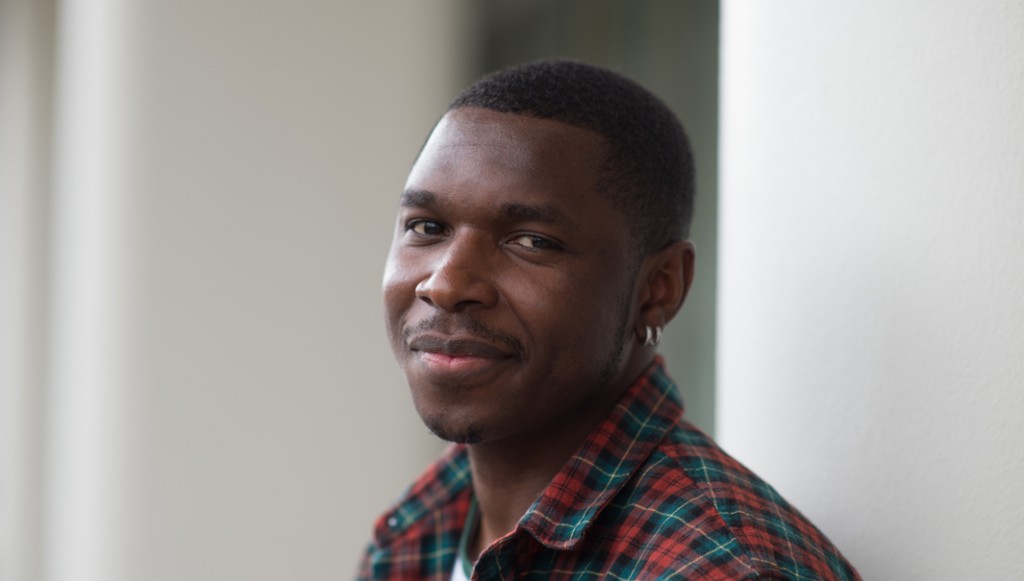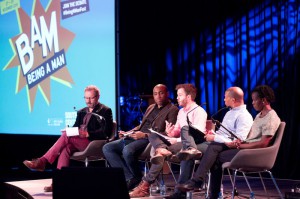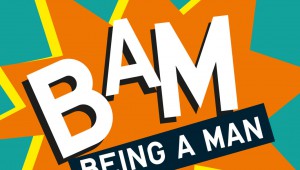New Gen Dads: An Interview with Yomi Sode

Poet and Blogger Yomi Sode has taken time out of his busy day job at a local London Authority to speak about his forthcoming ‘New African Dad’ panel discussion; part of the Southbank Centre’s Being A Man (BAM) Festival 2016. He joins me by phone, in a quiet corner of the office. He mentions that this interview has earned him some cachet amongst his colleagues. ‘They think I’m a bit of a celebrity’, he says with the good-natured, youthful enthusiasm that characterises the whole conversation.
A few years ago, inspired by a friend who was expecting his first child, Yomi began ‘The Daddy Diaries’; an online forum for men to discuss their thoughts, hopes, fears and everything in between, on fatherhood. At first, Yomi’s contributions were that of a son wrestling with his own complicated relationship with his dad. In 2014, he too joined the fraternity of fatherhood and could proffer insight from first-hand experience. The platform suits Sode down to the ground. He’s a sharer. This is by no means a criticism. It takes one to know one. I recognise the tangential trains of thought and ability to somehow wander back on topic via several colourful anecdotes.
Having previously attended the BAM festival, when the opportunity arose to put forward ideas for future events, Sode wasted no time contacting the organisers. In some respects, Yomi says, the ‘New African Dads’ event is an extension of The Daddy Diaries project, merely taking the conversation offline.
‘I think I’ve always wanted a space to have a healthy debate, a discussion and also an exchange of knowledge, even if it wasn’t around being a parent’.
Sode is spurred by the idea of building bridges of cultural understanding between elders and the younger generation. He’s recently benefitted from this himself.
‘I had a deadline to meet in regards to a poetry anthology that’s coming out next year. Lots of the poems that I’ve brought into this work are in Yoruba. My mum and step-dad were very helpful with putting the accents on some of the terminology. This is what I mean in terms of that knowledge set; to be able to lean on my elders to a certain degree and say “Whether I’m 10 or 40 I can still do this openly with you”. I was just thankful for that and it’s what I wanted to do through this month’s discussion.’
Another objective of the event is to understand how to navigate the cultural expectations that are passed down from one generation to the next. Yomi regales me with a long and animated account of a clash he had with his mother over the family’s nomenclature tradition when his son Noah was born two years ago. He believes this sort of miscommunication is caused by migrant African parents presuming their Western-raised children have knowledge of cultural rites that they themselves have never made explicit. But what about knowledge by osmosis?
‘It’s a different thing to expect me to pick it up from other people because I feel I should get it from the main source.’ Yomi avers. ‘When I talk about the New African Dad, as much as it is a title, I need to grab minds. There’s a new generation of African parents that probably have a plan in place that might not be to the standards or expectations of their forefathers. How does that balance? I got into a lot of arguments just to get my word across. If there’s a way to avoid that… by simply having a prior conversation with our children, so that they are aware. These are amazing rites of passage we should absolutely celebrate but in the event of us not knowing these things, we have to survive and navigate our way through a multicultural environment and that’s the hardest thing.’
We discuss further the sometimes tricky, but potentially enriching, intersection of the Afropean experience; growing up both influenced by African and European social mores. Natural-born anecdotist, Yomi provides another illustration of how these differences can take tangible form.
‘I tell you something very funny’, he chuckles. ‘My [Caribbean] friend said to me “Yomi, why do you have a bucket in your bath?” I was like “It’s just what you do”. He said “What do you mean ‘it’s just what we do’, bruv?!” Again it was a beautiful cultural moment; hilarious for both of us. And then I had a think: I’m 31 and I still have a bucket in my bath and I have no shame in it. That’s a cultural reference that I haven’t let go of, that I still embrace fully. So whenever Noah has a bath he asks for the bucket. These are the ways we subconsciously carry across [culture].’
How then does language – the ultimate conduit of culture – fit into all of this?
‘I’ve just started going to Yoruba classes every Monday evening in Tooting. I travel just to preserve the language because when I was growing up, if I tried to say certain things in Yoruba I’d get a laugh. It might be funny to the masses around me but it’s doing nothing to help my confidence trying to navigate my way in this Afropean setting.’
I steer the conversation back to ‘The Daddy Diaries’. As admirable as its premise is, there’s a distinct absence of female contributors. Is there not a place for a mother’s take on her significant other’s parenting? Yomi is no stranger to this line of questioning.
‘I’ve received emails from women asking, “Why can’t we contribute? Blah, blah, blah” and I totally understand. At the same time, when I do my research and I look into the amount of services that are there for women, there’s a lot. I’m not saying that ‘The Daddy Diaries’ is a pioneering project but it’s still a relatively small voice in the bigger pool of parenting [literature]. I just wanted to create that safe place where men could share stories for the masses. I think some of the dads wanted a community they can talk to. I want to create a space for men to really voice their vulnerability, their aspiration and their thoughts.’
And yet, although it wasn’t always the case, ‘The Daddy Diaries’ main readership is female.
‘What tends to happen is that afterwards the women will leave comments on the Facebook page or email the dad’s separately and then the dads engage by messaging them. It’s amazing how that’s worked out…’
Yomi’s mention of the scarcity of paternal literature calls to mind another societal conundrum. We want men to be more involved in parenting but it appears that the majority of literature is aimed at mothers. Despite legislative changes, men appear reluctant to take paternity leave and part of this could also be down to cultural expectations; rearing children is seen principally as a female preoccupation. Women, in our expectations of what a father should or shouldn’t do, can also be complicit in perpetuating the vicious cycle and entrenching inflexible gender roles. Yomi recounts the backlash he received on Facebook for cutting his son’s hair. His detractors, he claims, were predominantly women.
’“How dare you? That’s not your call to make! That’s the mum’s job!” Really? To get these comments can be really deflating for the man. If I wasn’t as strong in myself, it would make me not want to even partake in this parenting thing because I would just leave it all to her.’
‘I realised there has to be a shift. This needs to be seen as a balanced thing. Yes, I absolutely respect and honour the mother. I wouldn’t be able to do as many things as I’m doing if she wasn’t in the picture. But at the same time, she leans on me as much as I lean on her. It’s really interesting how that narrative of the role the dad does play is not spoken about as much. From when I’m being told I can’t even cut my [son’s hair]; it’s not my role. So what am I here to do?’
As well as being all male, The Daddy Diaries contributors are also of similar cultural backgrounds. This is by accident rather than design. I ask Yomi if he has any theories about why that is.
‘I’ll be honest, it’s not something I’ve given a lot of thought to’, he admits. ‘The only thing I can put it down to is that amongst the New Gen African Dads, in the midst of the Kanye Wests and Drakes and everything that’s happening, there might just be a sensitive side that’s not as afraid to talk. As opposed to your stereotypical older generation dad, that probably works and has his social hang-outs but internalises everything that happens. If they do speak up, that might be through religion, a friend or through a prayer. It won’t necessarily be through a ‘Daddy Diaries’ site.’

‘The New African Dad’ forum evidently has life beyond the Festival. Is this just a pilot for future events?
‘I have always been excited by pilots.’ Yomi beams. ‘All mine have gone on to bigger and better things and I truly hope it’s the same thing for this event’.
Yomi also sees the potential to reach out to an audience who might not normally go to a panel discussion.
‘My auntie is saying she’s coming and this is probably going to be the first thing she’s ever attended at the Southbank. There’s still this idea about institutions – “Oh no, that place ain’t the kind of place for us!” That’s why I want to create as much noise as possible because you can access this space. That’s why I selected the panellists the way I did; I know them personally and what they’ll want to bring to the discussion. I’m trying to build as many things as possible in the space of an hour to ensure that better things come from it.
‘I want to tour [the event]. I think it’s at a beautiful point in terms of talking about ‘blackness’ and looking deeper into the culture. I’m usually like – ‘he sighs with mock exasperation – ‘“What’s the point of having discussions if there are no solutions?” But let’s just try and open the gateway to talk to each other first and exchange that knowledge – see what we can take out of it.’
Yomi Sode will chair the panel discussion ‘The New African Dad’ on Friday 25 November as part of Southbank Centre’s 2016 BAM – Being A Man Festival. BAM is a festival that explores masculinity in the 21st Century. See www.southbankcentre.co.uk/bam for further information.



